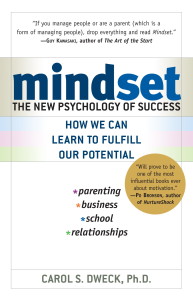 A few years ago I was introduced to and read thoroughly about a concept called mindset. Before my foray into the literature pertaining to mindset, I had heard many people use the term. Reflecting on its use in my past, mindset takes me back to my days of playing sports; figuring out ways to enter the game or match with the correct mindset. You know … the mindset of a winner.
A few years ago I was introduced to and read thoroughly about a concept called mindset. Before my foray into the literature pertaining to mindset, I had heard many people use the term. Reflecting on its use in my past, mindset takes me back to my days of playing sports; figuring out ways to enter the game or match with the correct mindset. You know … the mindset of a winner.
In my more recent past, entrepreneurial mindset and innovative mindset are phrases I hear frequently. How do entrepreneurs and innovators think and how can we adjust our thinking to be more creative, innovative, entrepreneurial?
Being a researcher, I decided to explore how mindset was formally discussed in the literature and how the concept had been used in research studies. This is when I found the work of Carol Dweck, a researcher and psychology professor at Stanford University who has committed her career to studying the concept of mindset and how it impacts behavior and achievement.
Dweck defines mindsets as “beliefs about yourself and your most basic qualities.” In her book, Mindset: The New Psychology of Success, she goes on to describe two distinct types of mindsets—fixed mindsets and growth mindsets.
How can growth versus fixed mindsets help companies?
A person with a fixed mindset holds the belief that they are the way they are and that their abilities, talents and intelligence are innate. These individuals tend to focus on being the best and doing things solely for the outcome. Think of an employee who only completes work because they want a promotion. People with fixed mindsets tend to respond poorly to negative and constructive feedback, often taking it as a personal attack on their innate characteristics.
On the other hand, a person with a growth mindset believes that they are able to develop and change their abilities, talents and intelligence. Instead of being innate, these qualities are enhanced with hard work and persistence. Here, an employee works hard because they know they will be better for it in the long run.
Individuals with a growth mindset respond well to negative and constructive feedback, recognizing it as an opportunity to improve.
The idea of these two very different mindsets has changed the way I approach almost every task and especially changed the way I respond to feedback. Attempting to apply the growth mindset to more and more aspects of my life, I now believe that life is continually providing me with constructive feedback that will help me grow and improve. Before, I would get frustrated and upset if I failed or received less than positive feedback.
What does this mean for corporate leaders?
Keeping in mind the differences between these mindsets and their impact on an organization, here are some questions for you to consider as a leader and manager:
- Is your mindset growth, fixed, or both?
- Do you foster a growth or fixed mindset among your employees?
- How do mindsets impact your organization and its potential for success?
Carol Dweck, Lewis & Virginia Eaton Professor of Psychology at Stanford University, has been published extensively on mindsets in many top-tier academic journals. For more information on her work, visit her at http://dweck.socialpsychology.org/.
Book image: Provided courtesy of Carol Dweck.